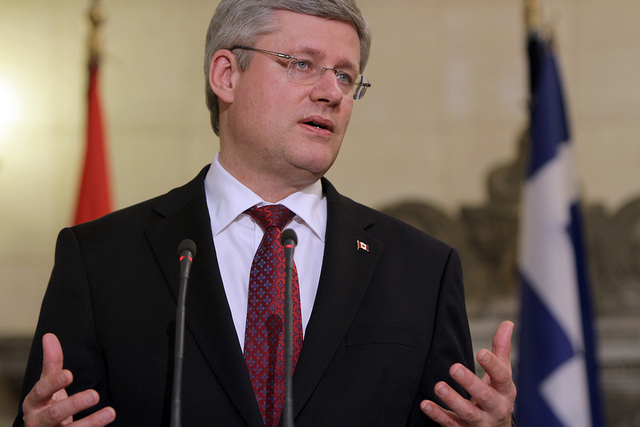Please help rabble.ca stop Harper’s election fraud plan.Become a monthly supporter.
In April, a brutal Egyptian judge known locally as “the Butcher” handed down a mass death sentence to 683 men. To most civilized observers, this kind of action is associated with the world’s most tyrannical regimes.
But to the Harper government, this is the behaviour of a country “progressing towards democracy.”
This benign and even upbeat description of the current dictatorship in Egypt was part of the Harper government’s lackadaisical public response this week when Canadian journalist Mohamed Fahmy (along with two other journalists) was sentenced to seven years’ imprisonment for the crime of broadcasting “false news” — a sentence that provoked appropriate outrage from world leaders.
The notion that the Egyptian regime of Field Marshal Abdel-Fatah al-Sissi, which seized power last year in a military coup that ousted Egypt’s first democratically elected government, is “progressing towards democracy” comes from the same school of thought that hailed George W. Bush as a champion of democracy for invading Iraq. (That worked out well.)
Rather than being on the slow road to democracy, the current Egyptian regime is the final nail in the coffin of the once awe-inspiring ‘Arab Spring,’ which saw millions of democracy-hungry Egyptians pouring into the streets of Cairo and toppling the military dictatorship of Hosni Mubarak (who, let’s not forget, enjoyed Western support for decades).
After a brief experiment with democracy, the Egyptian military has fully retaken control, killing or rounding up thousands of its political opponents.
On the bright side, the Egyptian courts reduced the number of men facing mass execution from 683 to 183. You can almost feel the pistons of democracy firing up.
Former U.S. president Jimmy Carter had this to say last month: “I am gravely concerned that Egypt’s democratic transition has faltered.”
But with the PM’s parliamentary secretary Paul Calandra insisting Canada didn’t want to “insult” Egypt, the Harper government took a pass on carrying out one of its most basic responsibilities: vigorously defending the rights of an innocent and helpless Canadian facing a lengthy jail term in a hell-hole prison.
After considerable criticism, the Harper government now insists that it is working behind the scenes, reluctant to use a “bullhorn” — something it never hesitates to use when, for instance, denouncing democratic failings in Russia or Iran.
Mohamed Fahmy’s problem is that he’s been imprisoned by a regime that Harper rather likes — and for reasons that have nothing to do with its alleged progress towards democracy.
Harper has never cared about democracy in Egypt. On the contrary, democracy there has been seen as a threat to the interests of Harper’s most favoured ally, Israel, which has long relied on the Egyptian government to help it enforce its blockade of Gaza — a blockade that is extremely unpopular among the Egyptian people.
So, while most of the world celebrated the unexpected eruption of the Arab Spring in Cairo three years ago — and even Washington eventually abandoned its long-time ally Mubarak — the Harper government remained wary, reluctant to see the end of a helpful dictator.
Lawrence Cannon, Harper’s foreign minister at the time, indicated Canada was willing to go along with Mubarak’s sluggish timetable for reform — presumably part of the long and winding road towards democracy.
Harper’s fears were realized when Egyptians, in their first elections ever, voted in the Muslim Brotherhood, which established closer ties to the blockaded Palestinians in Gaza.
Harper has no interest now in defending Mohammed Fahmy because it interferes with his higher priority — giving a free hand to the newly restored pro-Israel military dictatorship, which has enthusiastically taken up enforcing the Gaza blockade.
This reluctance to champion Fahmy’s cause is part of the way Canada’s foreign policy has become “extraordinarily skewed” towards Israel, former Canadian ambassador to Egypt Ferry de Kerckhove said in an interview Tuesday on CBC TV’s Power and Politics.
De Kerckhove noted that U.S. President Barack Obama, UK Prime Minister David Cameron and Australian PM Tony Abbott all protested the harsh sentences against the journalists because those leaders “still think that freedom of the press is a higher value to defend.” De Kerckhove contrasted this with the way the Harper government “puts the security of Israel ahead of some of the fundamental values that they pretend to be fostering.”
Of course, the security of nuclear-armed Israel isn’t actually at risk. But Israel’s ability to crush the resistance to its 45-year occupation of Palestinian land is greatly aided by having a supportive dictator next door.
And so, in Harper’s world of Canadian values, freedom of the press and freedom from unjust incarceration will have to wait as the Butcher and the rest of Egypt’s revived military dictatorship take their time “progressing towards democracy.”
Winner of a National Newspaper Award, Linda McQuaig has been a reporter for the Globe and Mail, a columnist for the National Post and the Toronto Star. She was the New Democrat candidate in Toronto Centre in 2013. She is the author of seven controversial best-sellers, including Shooting the Hippo: Death by Deficit and other Canadian Myths and It’s the Crude, Dude: War, Big Oil and the Fight for the Planet. Her most recent book (co-written with Neil Brooks) is The Trouble with Billionaires: How the Super-Rich Hijacked the World, and How We Can Take It Back.
This article is reprinted with permission from iPolitics ![]()
Photo: flickr/Αντώνης Σαμαράς Πρωθ



